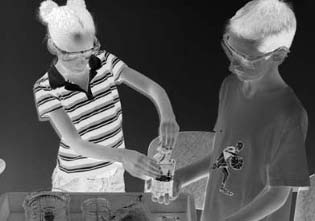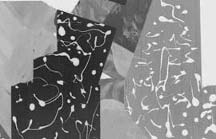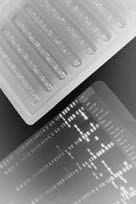Scientific explanations are consistent with
the available evidence and are subject
to criticism and revision. Furthermore,
scientific explanations extend beyond
current knowledge and propose new
understandings that extend the knowledge
base. The same is true for students who
generate new ideas by building on their
personal knowledge base.
4. Learners evaluate their explanations
in light of alternative explanations,
particularly those reflecting scientific
Figure 6. Communicating results is an
understanding.
important part of scientific inquiry.
Scientific inquiry differs from other forms
Inquiry lessons can be described as either
of inquiry in that proposed explanations
full or partial with respect to the five essential
may be revised or thrown out altogether
elements of inquiry described in the table on
in light of new information. Students may
page 26. Full-inquiry lessons make use of each
consider alternative explanations as they
element, although any individual element can
compare their results with those of others.
vary with respect to how much direction comes
Students also should become aware of how
from the learner and how much comes from
their results relate to current scientific
the teacher. For example, inquiry begins with
knowledge.
a scientifically oriented question. This question
may come from the student, or the student may
choose the question from a list. Alternatively,
Learners give priority to evidence, which
the teacher may simply provide the question.
allows them to develop and evaluate
explanations that address scientifically
Inquiry lessons are described as partial when
oriented questions.
one or more of the five essential elements of
inquiry are missing. For example, if the teacher
5. Learners communicate and justify their
demonstrates how something works rather than
proposed explanations.
allowing students to discover it for themselves,
then that lesson is regarded as partial inquiry.
Scientists communicate their results in
Lessons that vary in their level of direction are
such detail that other scientists can attempt
needed to develop students’ inquiry abilities.
to reproduce their work. Replication
When young children are first introduced to
provides science with an important vehicle
inquiry lessons, they are not developmentally or
for quality control. Other scientists can
academically ready to benefit from full inquiry
also use the results to investigate new but
lessons. Partial or guided inquiry lessons usually
related questions. Students, too, benefit by
work for them then. Guided inquiry may also
sharing their results with their classmates.
work well when the goal is to have students earn
This gives them an opportunity to ask
some particular science concept. In contrast, a
25
Information about the Process of Scientific Inquiry
Doing Science: The Process of Scientific Inquiry
Essential Features of Classroom Inquiry and Their Variations
Essential
Variations
Feature
Learner engages
Learner poses a
Learner selects
Learner sharpens
Learner engages
in scientifically
question
among questions, or clarifies a
in a question
oriented
poses new
question provided provided by the
questions
questions
by the teacher,
teacher, materials,
materials, or other or other source
source
Learner gives
Learner
Learner is
Learner is given
Learner is given
priority to
determines
directed to collect data and asked to
data and told how
evidence in
what constitutes
certain data
analyze
to analyze
responding to
evidence and
questions
collects it
Learner
Learner
Learner is guided Learner is given
Learner is provided
formulates
formulates
in process of
possible ways
with evidence
explanations from explanations after formulating
to use evidence
evidence
summarizing
explanations from to formulate
evidence
evidence
explanation
Learner connects
Learner
Learner is
Learner is
explanations
independently
directed toward
given possible
to scientific
examines other
areas and sources connections
knowledge
resources and
of scientific
forms the links to knowledge
explanations
Learner
Learner forms
Learner is
Learner is provided Learner is
communicates
reasonable and
coached in
broad guidelines
given steps and
and justifies
logical argument
development of
to use to sharpen
procedures for
explanations
to communicate
communication
communication
communication
explanation
More <---------------------------- Amount of Learner Self-Direction -------------------------------> Less
Less <---------------------- Amount of Direction from Teacher or Material -----------------------> More
Source: National Research Council. 2002. Inquiry and the National Science Education Standards: A Guide for Teaching and Learning. Washington, D.C.: National Academy Press.
full or open inquiry is preferred when the goal
appropriate for middle school students that
is to have students hone their skills of scientific
are taken from the NSES content standards for
reasoning. The following Content Standards
Science as Inquiry.9
for Science as Inquiry, Grades 5–8, table lists
abilities and understandings about inquiry
26
Content Standards for Science as Inquiry, Grades 5–8
Fundamental Abilities Necessary to Do Scientific Inquiry
• Identify questions that can be answered through scientific investigations.
• Design and conduct a scientific investigation.
• Use appropriate tools and techniques to gather, analyze, and interpret data.
• Develop descriptions, explanations, predictions, and models using evidence.
• Think critically and logically to make the relationships between evidence and explanations.
• Recognize and analyze alternative explanations and predictions.
• Use mathematics in all aspects of scientific inquiry.
Fundamental Understandings about Scientific Inquiry
• Different kinds of questions suggest different kinds of scientific investigations.
• Current scientific knowledge and understanding guide scientific investigations.
• Mathematics is important in all aspects of scientific inquiry.
• Technology used to gather data enhances accuracy and allows scientists to analyze and quantify results of investigations.
• Scientific explanations emphasize evidence, have logically consistent arguments, and use scientific principles, models, and theories.
• Science advances through legitimate skepticism.
• Scientific investigations sometimes result in new ideas and phenomena for study, generate new methods or procedures for an investigation, or develop new technologies to improve the collection of data.
Source: National Research Council. 1996. National Science Education Standards. Washington, D.C.: National Academy Press.
5 Misconceptions about Inquiry-Based
Misconception 1: Inquiry-based instruction
Instruction
is the application of the “scientific method.”
Despite the consensus found in educational
Teachers have a tendency to teach their
research, teachers may have different
students in the same way that they were
ideas about the meaning of inquiry-based
taught. Many teachers learned as students that
instruction. At one extreme are teachers
science is a method for answering questions
who believe they are practicing inquiry
and solving problems. They were told that
by posing questions to their students and
the process of science can be reduced to a
guiding them toward answers. At the other
series of five or six simple steps. This concept
extreme are teachers who feel they are not
of the scientific method in American science
practicing inquiry unless they allow their
education goes back to John Dewey during the
students to engage in a lengthy open-ended
first part of the 20th century. In reality, there is
process that directly mimics scientific
no single scientific method. Scientists routinely
research. Given these two extremes, it is not
use a variety of approaches, techniques, and
surprising that misconceptions about inquiry-
processes in their work. The notion that
based instruction abound. Some of the more
scientific inquiry can be reduced to a simple
prevalent misconceptions have been wrongly
step-by-step procedure is misleading and fails
attributed to the NSES.11 These mistaken
to acknowledge the creativity inherent in the
notions about inquiry serve to deter efforts to
scientific process.
reform science education. The materials in this
curriculum supplement have been designed
to dispel misconceptions about inquiry-based
In reality, there is no single scientific
instruction.
Method.
27
Information about the Process of Scientific Inquiry

Doing Science: The Process of Scientific Inquiry
Misconception 2: Inquiry-based instruction
or that require students to analyze discrepant
requires that students generate and pursue
information. Students tend to need more time
their own questions. For some teachers,
to construct their understandings of abstract
open-ended inquiry seems to best mirror the
concepts than they need for more concrete
process of inquiry practiced by scientists.
information.
They may believe that if such open-ended
inquiry is not possible, then they should resort
Misconception 5: Inquiry-based instruction
to more traditional forms of instruction. In
can be easily implemented through use of
fact, there is no single form of inquiry that
hands-on activities and educational kits. Such
is best in every situation. In many instances,
lessons and materials help teachers implement
the educational goal is to have students learn
inquiry-based instruction in the classroom.
some specific science content. In such cases, it
They also help students focus their thinking
is the questions themselves, rather than their
in appropriate areas. However, there is no
source, that are most important. Even if the
guarantee that student learning will go beyond
teacher provides the student with a question,
performing the tasks at hand. It is possible for a
an inquiry-based approach to the answer is still
student to successfully complete an experiment
possible.
and yet not understand the science concept it
is designed to teach. Inquiry-based instruction
Misconception 3: Inquiry-based instruction
requires students to actively participate by
can take place without attention to science
gathering evidence that helps them develop
concepts. During the 1960s, it became
an understanding of a concept. The teacher
fashionable to promote the idea of process
must evaluate how well the lesson or materials
over substance. Teachers were sometimes told
incorporate the essential features of inquiry
that they (and their students) could learn
and use them accordingly.
the process of inquiry in isolation and then
apply it on their own to subject matter of their
choice. However, this elevation of process
over substance negates lessons learned from
research on student learning. Students first
begin to construct their learning using their
prior knowledge of the topic and then inquire
into areas that they do not yet understand.
Misconception 4: All science should be taught
through inquiry-based instruction. Inquiry-
based instruction is a tool used by teachers
to help them attain educational goals for
their students. Despite its usefulness, inquiry
Figure 7. Hands-on activities help engage
is not the most appropriate tool for every
students’ interest. Their use, however, does
instructional situation. Teaching science,
not guarantee that science concepts are
as well as the practice of science, requires
understood.
varied approaches. Using any single method
exclusively is less effective than using a
Misconception 6: Student interest generated
combination of methods. Ultimately, using a
by hands-on activities ensures that inquiry
single method becomes boring for the student.
teaching and learning are occurring. Student
Inquiry-based instruction is perhaps most
engagement in the topic is a critical first step in
appropriate when teaching concepts that do not
learning. Many students certainly prefer hands-
conform to common student preconceptions
on activities to sitting through a lecture. This
28
enthusiasm does not necessarily translate into
communicating scientific explanations (see the
learning. The teacher must assess the students’
Essential Features column in the table on page
level of mental engagement with inquiry,
26).
challenge naive conceptions, ask probing
questions, and prompt students to revise,
It is important to recognize that the process
refine, and extend their understanding.
of scientific inquiry is not linear. When
students learn about the process, they often
Misconception 7: Inquiry-based instruction is
try to simplify it into a series of steps to
too difficult to implement in the classroom.
follow. Teachers, too, often teach inquiry
Teachers unfamiliar with inquiry-based
as the “scientific method” with a lock-step
instruction may be uncomfortable trying
linear process. Why do students and teachers
something new. They may reason that they
try to make inquiry a step-by-step process?
were not taught using these methods and
They are misled by the formal, orderly way
question why their students should be any
scientific research is published. Students
different. Common excuses for not using
and teachers may believe that scientists
inquiry are that it takes too much time, does
went about answering their questions in the
not work with large classes, or does not work
same orderly fashion. In fact, that is not how
with less-capable students. These frustrations
science is done. Aspects of scientific inquiry
typically result from improper use of inquiry
interact in complex ways. New evidence, new
methods rather than from any inherent
observations, and new lines of questioning can
problem with the inquiry approach itself. When
lead scientists in a circuitous route, the end
teachers understand the essential features
of which, they hope, is a good explanation for
of inquiry, its flexibility in the classroom,
a set of phenomena. For example, questions
and students’ willingness to embrace it, they
lead to the design of an investigation, and the
usually come to regard it as an essential
evidence gathered through the investigation
strategy in their teaching.
may lead to more questions.5
Students first begin to construct their
This module focuses on three elements of
learning using their prior knowledge of the
scientific inquiry: science as a way of knowing,
scientifically testable questions, and scientific
topic and then inquire into areas that they
evidence and explanations. Although these
do not yet understand.
elements are the focus, students are exposed
to other elements, such as conducting
6 Important Elements of Scientific
investigations, using mathematics in inquiry,
Inquiry for this Module
and communicating scientific explanations.
Teaching the process of scientific inquiry
might seem different from teaching content-
6.1 The Nature of Scientific Inquiry:
related material in the life or physical sciences.
Science as a Way of Knowing
As the basis for Content Standard A in the
An important aspect of scientific inquiry is
National Science Education Standards, scientific
that science is only one of many ways people
inquiry can be broken down into discrete
explore, explain, and come to know the world
steps or methods that students can practice,
around them. There are threads of inquiry and
just as content can be broken down into
discovery in almost every way that humans
distinct concepts that students can explore.
know the world. All of the ways of knowing
The process of scientific inquiry involves
contribute to humanity’s general body of
generating questions, designing investigations
knowledge.
to answer questions, making predictions
based on scientific concepts, gathering data,
Each way of knowing addresses different issues
using evidence to propose explanations, and
and answers different questions. Science is a
29
Information about the Process of Scientific Inquiry


Doing Science: The Process of Scientific Inquiry
way of knowing that accumulates data from
scientific inquiry, but not all questions can
observations and experiments, draws evidence-
be answered using scientific investigations.
based conclusions, and tries to explain things
Questions can be divided into two categories:
about the natural world. Science excludes
existence and causal. Existence questions,
supernatural explanations and personal
which often begin with why, generally require
wishes.8
recall of factual knowledge.4, 6 Causal questions,
which begin with how, what if, does, and I
In some ways of knowing, the meaning of
wonder, can be addressed through scientific
statements or products is open to interpretation
investigations.6 True cause and effect is very
by any viewer. Science is different because
difficult to prove scientifically. Often, scientists
it is characterized by a specific process of
rely on statistical and other analytical methods
investigation that acquires evidence to support
to determine the likelihood that certain
or reject a particular explanation of the world.
relationships exist.
While the meaning of the evidence can be
Science answers questions that are different
debated, the evidence itself is based on careful
from those answered by other ways of
measurement and can be reproducibly collected
knowing. Testable questions are answered
by any individual using appropriate techniques.
through observations or experiments that
provide evidence. Students need guidance and
Science is often presented as a collection of
practice to be able to distinguish questions that
facts, definitions, and step-by-step procedures.
are testable from those that are not. A testable
However, science is much more than this.
question meets these criteria:
Through science we ask questions, collect data,
• The question centers on objects, organisms,
and acquire new knowledge that contributes
and events in the natural world.
to our growing understanding of the natural
• The question connects to scientific concepts
world.
rather than to opinions, feelings, or beliefs.
• The question can be investigated through
6.2 Scientifically Testable Questions
experiments or observations.
Students are naturally curious and often
• The question leads to gathering evidence






